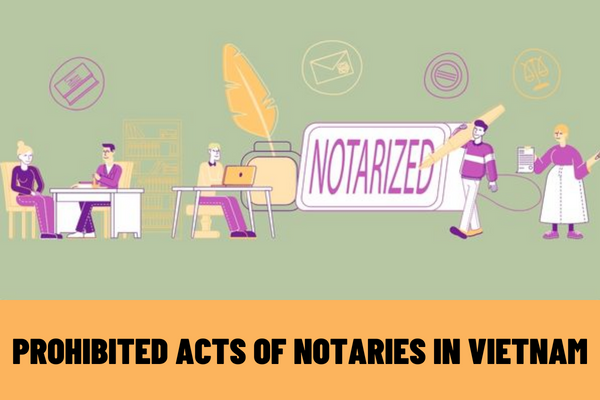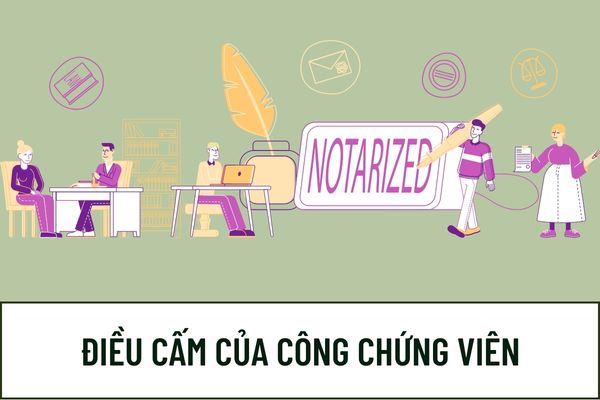Can I act as both a notary and a lawyer at the same time? What are the obligations of notaries in Vietnam?
Can I act as both a notary and a lawyer at the same time?
Pursuant to Point k, Clause 1, Article 7 of the 2014 Law on Notarization of Vietnam stipulating as follows:
Prohibited acts
1. Notaries and notarial practice organizations are prohibited from committing the following acts:
…
k/ A notary practicing his/her profession concurrently at two or more notarial practice organizations or performing other regular jobs;
Thus, notaries are not allowed to concurrently hold other regular jobs.
Therefore, an individual who acts as both a notary and a lawyer is prohibited by law.
Moreover, the case where an individual works as both a notary and a lawyer will lead to conflicts of interest in the notarization of documents and papers in service of the case or case. This will greatly affect the objectivity and transparency of documents and papers.

Can I act as both a notary and a lawyer at the same time? What are the obligations of notaries in Vietnam?
Can I act as both a notary and an owner of a single member limited liability company?
Pursuant to Clause 1, Article 7 of the 2014 Law on Notarization of Vietnam on one of the prohibited acts of notaries, in which:
Prohibited acts
1. Notaries and notarial practice organizations are prohibited from committing the following acts:
a/ Disclosing information on the contents of notarized documents, unless notarization requesters so agree in writing or otherwise provided by law; using information on notarized contents to infringe upon lawful rights and interests of individuals and organizations;
b/ Notarizing contracts, transactions or translations the purposes and contents of which violate law or are contrary to social ethics; inciting or creating conditions for parties to contracts or transactions to conduct sham transactions or commit other deceitful acts;
c/ Notarizing contracts, transactions or translations which are related to properties or interests of their own or of their relatives being spouses; natural parents, adoptive parents; natural parents, adoptive parents of their spouses; natural children, adopted children or children-in-law; grandparents, siblings or siblings-in-law; and natural grandchildren, adopted grandchildren;
d/ Refusing notarization requests without plausible reasons; harassing or causing difficulties to notarization requesters;
…
k/ A notary practicing his/her profession concurrently at two or more notarial practice organizations or performing other regular jobs;
l/ A notary participating in the management of an enterprise other than his/her notarial practice organization; providing brokerage or agency services; receiving profits from a contract or transaction which he/she has notarized.
According to the above regulations, similar to the above case, individuals who are notaries are not allowed to participate in the management of enterprises other than notarization practice organizations. This is one of the prohibitions for individuals to practice notarization.
Thus, a person who is currently a notary cannot concurrently own a single member limited liability company.
On the other hand, an individual who both works as a notary but also manages the business can lead to fraudulent acts; forced dishonesty when performing notarization.
What are the rights and obligations of notaries in Vietnam?
Pursuant to Article 17 of the 2014 Law on Notarization of Vietnam stipulating as follows:
Rights and obligations of notaries
1. Notaries have the following rights:
a/ To have their right to notarial practice protected by law;
b/ To participate in the establishment of notary offices or work under contracts for notarial practice organizations;
c/ To notarize contracts, transactions and translations in accordance with this Law;
d/ To request related individuals, agencies and organizations to provide information and documents serving the notarization;
dd/ To refuse to notarize contracts, transactions and translations which violate law or are contrary to social ethics;
e/ To have other rights as prescribed in this Law and other relevant laws.
2. Notaries have the following obligations:
a/ To abide by the principles of notarial practice;
b/ To practice at a notarial practice organization;
c/ To respect and protect lawful rights and interests of notarization requesters;
d/ To explain to notarization requesters their lawful rights, obligations and interests, and legal significance and consequences of notarization; if refusing notarization requests, to clearly state the reasons to notarization requesters;
dd/ To keep secret contents of notarized documents, unless otherwise agreed in writing by notarization requesters or provided by law;
e/ To attend notary re-training courses every year;
g/ To take responsibility before law and notarization requesters for documents they have notarized; to take responsibility before law for operations of notary offices of which they are partners;
h/ To join socio-professional organizations of notaries;
i/ To be managed by competent state agencies, notarial practice organizations where they work and the notaries’ socio-professional organization of which they are members;
k/ To have other obligations as prescribed by this Law and other relevant legal documents.
Thus, the notary will have the rights and obligations as prescribed above.
LawNet
